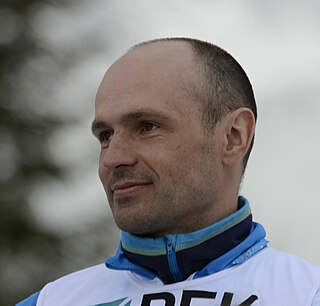
The 1994 Winter Olympics, officially known as the XVII Olympic Winter Games and commonly known as Lillehammer '94, were an international winter multi-sport event held from 12 to 27 February 1994 in and around Lillehammer, Norway. Having lost the bid for the 1992 Winter Olympics to Albertville in France, Lillehammer was awarded the 1994 Winter Games on 15 September 1988, two days before the 1988 Summer Olympics opening ceremonies at the 94th IOC Session in Seoul, South Korea. Due to the calendar changes made in 1986, this was the only time that the Winter Olympics took place two years after the previous Winter Games, and the first to be held in a different year from the Summer Olympics. This was also the first Winter Olympics to be held during the Commonwealth Games and FIFA World Cup year. This was the second Olympic Games of any type hosted in Norway — the first being the 1952 Winter Olympics in Oslo — and the fourth Olympics overall to be held in a Nordic country, after the 1912 Summer Olympics in Stockholm, Sweden, and the 1952 Summer Olympics in Helsinki, Finland. Lillehammer is the northernmost city ever to host the Olympic Games.

The 1994 Winter Paralympics, the sixth Paralympic Winter Games, were held in Lillehammer, Norway, from 10 to 19 March 1994.The Lillehammer Paralympics were the second time that the Games were held in Norway, after the 1980 Winter Paralympics in Geilo. 471 athletes from 31 countries participated, with Norway claiming the most gold medals ahead of Germany. This was the first Paralympics which the International Paralympic Committee had 100% involvement and responsibility and the first Games with their own logo.

Estonia participated in the X Summer Paralympic Games in Atlanta, United States. Estonian team representatives were Estonian Paralympic Committee president and Estonian Minister of Social Affairs Toomas Vilosius, head secretary Allan Kiil, secretary Maarit Vabrit and coaches Margit Aidla, Mallika Koel, Rein Põldme and Rein Valdru. Only press member was Are Eller.

Estonia participated in the IX. Summer Paralympic Games in Barcelona, Spain. It won 2 silver and 1 bronze medal. The Estonian flag bearer at the opening ceremony was Nadežda Maksimova.

Estonia participated in the VIII Winter Paralympic Games in Salt Lake City, Utah, United States. The Estonian flag bearer at the opening ceremony was Kaido Kalm.

Estonia participated in The VII. Winter Paralympic Games in Nagano, Japan. Estonian flag bearer at the opening ceremony was Vilma Nugis.

Estonia participated in The V. Winter Paralympic Games in Tignes-Albertville, France.
Cross-country skiing at the 1994 Winter Paralympics consisted of 48 events, 29 for men and 19 for women.

The United States sent a delegation to compete at the 2010 Winter Paralympics in Vancouver, British Columbia, Canada. A total of 50 U.S. competitors took part in all five sports. The American delegation included five former members of the U.S. military, including a veteran of the Iraq War and a veteran of the War in Afghanistan.

The United Kingdom of Great Britain and Northern Ireland competed at the 1992 Winter Paralympics held in Tignes and Albertville, France. The team was known by it shortened name of Great Britain, for identification purposes.

Iceland made its Winter Paralympic Games début at the 1994 Winter Paralympics in Lillehammer. The country sent only one competitor, who took part in ice sledge speed racing. He did not win a medal.

The United Kingdom of Great Britain and Northern Ireland competed at the 1994 Winter Paralympics held in Lillehammer, Norway. The team was known by it shortened name of Great Britain, for identification purposes. Twenty-three athletes, all of whom were men,. competed for Britain. The team won five medals at the Games, all bronze, and finished 21st in the medal table. Richard Burt won two medals in alpine skiing, as he had done in the 1992 Games. In addition to the medal performances the team had seven top ten finishes.

Vitaliy Volodymyrovych Lukyanenko is a Ukrainian biathlete, cross-country skier, and Paralympian.
Richard Burt is a British former Paralympic skier who won medals at the 1992 Winter Paralympics and 1994 Winter Paralympics.

LW10 is a para-alpine and para-Nordic sit-skiing classification for skiers who cannot sit up without support. For international skiing competitions, classification is conducted by IPC Alpine Skiing and IPC Nordic Skiing, while national federations such as Alpine Canada handle classification for domestic competitions.
This article contains a chronological summary of major events from the 2014 Winter Paralympics, which took place in Sochi, Russia.
Vilma Nugis is an Estonian para skier.
Gerda Pamler is a German former Paralympic alpine skier and artist. She competed at the 1992, 1994 and 1998 Winter Paralympics. She won six medals, two gold, three silver and one bronze.
Cecilia Paulson is a Swedish Paralympic alpine skier. She represented Sweden in Paralympic Alpine skiing, at the 1994 Paralympic Winter Games, 1998 Paralympic Winter Games, and 2002 Paralympic Winter Games. She won four medals: two silvers and two bronzes.
Vreni Stöckli is a Swiss paralympic alpine skier. She represented Switzerland in three Paralympic Winter Games, winner of two silver medals and one bronze medal.








